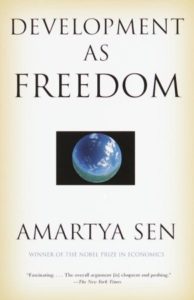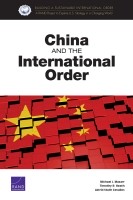 India’s status as the world’s largest democracy and its non-Western identity have buttressed the argument that democracy is a universal idea, says a leading democracy practitioner. In addition, the fact that India was also a relatively poor country supported the related argument that a high level of economic development is not a necessary precondition for achieving democratic sustainability, notes Carl Gershman, president of the National Endowment for Democracy.
India’s status as the world’s largest democracy and its non-Western identity have buttressed the argument that democracy is a universal idea, says a leading democracy practitioner. In addition, the fact that India was also a relatively poor country supported the related argument that a high level of economic development is not a necessary precondition for achieving democratic sustainability, notes Carl Gershman, president of the National Endowment for Democracy.
Amartya Sen’s keynote address to the World Movement for Democracy’s founding assembly in New Delhi in 1999 was a seminal statement that drew upon the Indian experience in defending the idea of democratic universalism. According to Sen, “the rise of democracy” was the most important thing that had happened in the twentieth century and had created the expectation that democracy was “the ‘normal’ form of government to which any nation is entitled.” Democracy had achieved this status, in Sen’s view, because it had three fundamental values that contribute to the betterment of the human condition, Gershman told the New Delhi-based Institute of Social Sciences:
 The first is democracy’s intrinsic value that derives from the fact that “political freedom is part of human freedom in general, and exercising civil and political rights is a crucial part of good lives of individuals as social beings.”
The first is democracy’s intrinsic value that derives from the fact that “political freedom is part of human freedom in general, and exercising civil and political rights is a crucial part of good lives of individuals as social beings.”- Democracy also has an instrumental value, according to Sen, because it protects people from the abuse of their rights; enables them to organize and work for the advancement of their political, social, and economic interests; and gives citizens the tools to hold governments accountable, thereby fostering good governance and the rule of law.
- Finally, he said that democracy has a constructive value, meaning that through democratic participation, people “learn from one another” and become more experienced citizens who can help society form its values and priorities.
 Those who value democracy in Asia—and even many who don’t—are desperate for a counterweight to the rise of a new authoritarian superpower, Stanford University’s Larry Diamond writes for The American Interest.
Those who value democracy in Asia—and even many who don’t—are desperate for a counterweight to the rise of a new authoritarian superpower, Stanford University’s Larry Diamond writes for The American Interest.
China’s international behavior has alarmed its neighbors as well as the United States and Europe, the NED’s Gershman adds. Among the threatening actions it has taken are:
- the fortification of reefs in the disputed Spratly Islands, in defiance of a ruling by a U.N. arbitral tribunal;
 the comprehensive buildup of its military forces that a recent Pentagon study described as “perhaps the most ambitious grand strategy undertaken by a single nation-state in modern times;”
the comprehensive buildup of its military forces that a recent Pentagon study described as “perhaps the most ambitious grand strategy undertaken by a single nation-state in modern times;”- the execution of a massive and multi-decade plan to use industrial espionage and cyber theft to acquire artificial intelligence and other critical future technologies with military as well as commercial applications;
- the launch of the $1 trillion Belt and Road Initiative targeting more than sixty countries to advance Beijing’s military and geopolitical goals, including securing access to strategic ports and terminals and the export of Chinese techniques of state surveillance and dispute resolution; and
 the promotion of an ideological offensive against democracy, involving the investment of $10-15 billion in so-called Sharp Power information tools to manipulate target populations and promote its own preferred authoritarian ideas, norms, and models of governance.
the promotion of an ideological offensive against democracy, involving the investment of $10-15 billion in so-called Sharp Power information tools to manipulate target populations and promote its own preferred authoritarian ideas, norms, and models of governance.
“China has emerged as a major geopolitical, economic, and ideological rival of the world’s leading democratic countries,” Gershman adds, “using the leverage of military, economic, and ideological power to promote its own model of authoritarian development as an alternative to democracy.”
 One of the drivers of the U.S. Indo-Pacific Strategy is to bring together like-minded democracies to defend against Chinese attempts to disrupt the international rules-based order, universal liberal values, and free access to the maritime global commons, Georgetown University’s Oriana Skylar Mastro writes for Lawfare:
One of the drivers of the U.S. Indo-Pacific Strategy is to bring together like-minded democracies to defend against Chinese attempts to disrupt the international rules-based order, universal liberal values, and free access to the maritime global commons, Georgetown University’s Oriana Skylar Mastro writes for Lawfare:
If the Indian military can present a challenge to the Chinese military, then the Chinese government must tacitly acknowledge the possibility that another country, and a democratic one at that, can rise successfully without the CCP at the helm. The Party fears that such an admission, even if not explicit, would undermine the government’s legitimacy in the eyes of the people. In short, internal stability depends on the Chinese people’s continued belief in the often-heard argument that “there is no developing country in the world that achieves prosperity and stability under Western-style democracy.”







